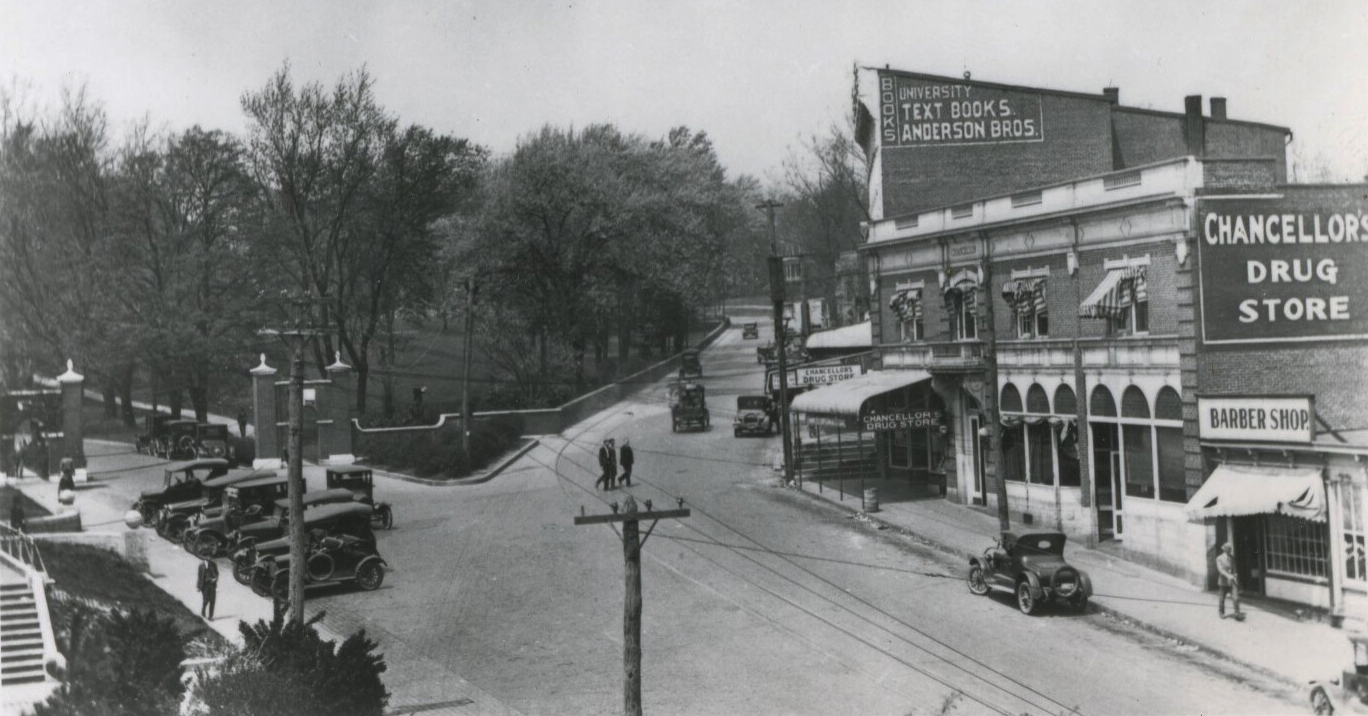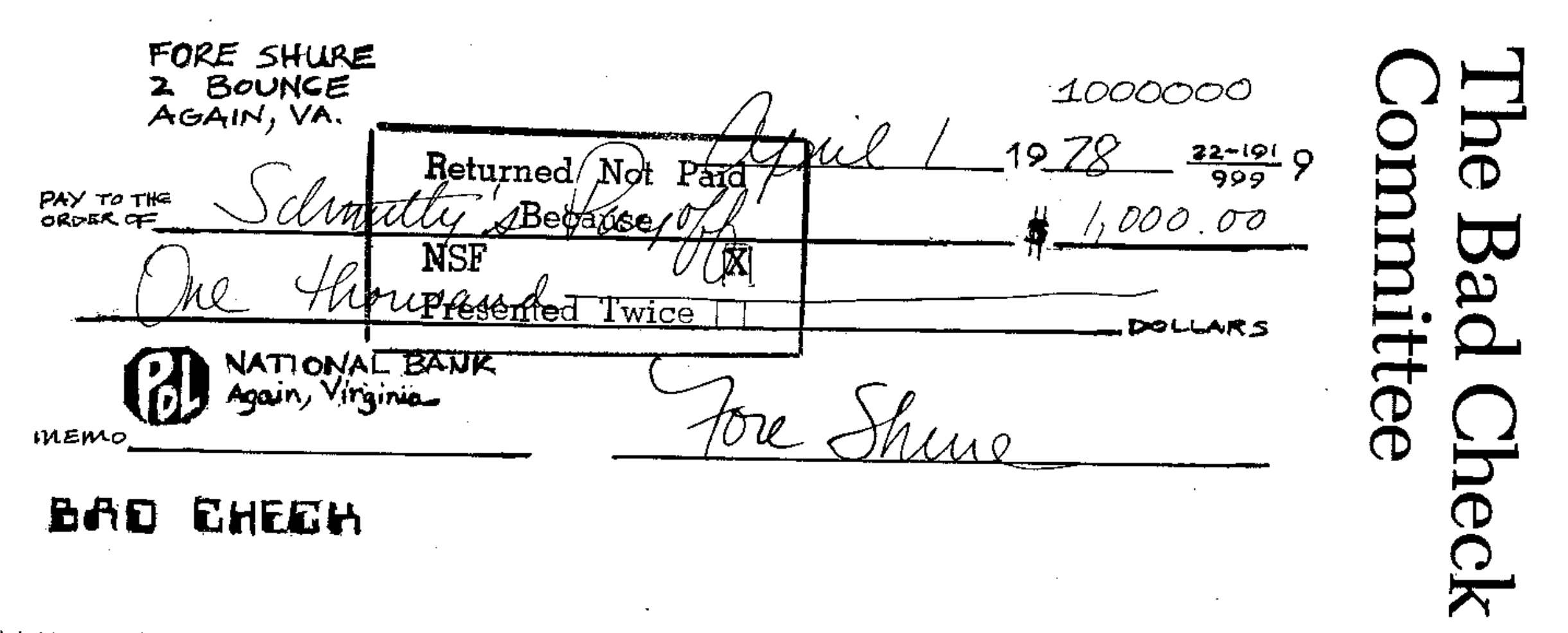

The Bad Check Committee
Author: Derrick Wang (College 2020) | February/11/2019
Every student at the University of Virginia knows that the Honor Committee oversees all cases of lying, cheating, and stealing. But not so long ago, the Honor Committee also had another major responsibility, one that took much of its energy and time. From 1913 until the early 2000’s, the Honor Committee was responsible for adjudicating students who wrote bad checks to local merchants. Though it might seem strange that the Honor Committee once put so much effort into getting students to settle their debts, this was once a crucial part of Honor’s community relations.
Writing checks seems quaint now, especially in the age of digitized finance, but students used to regularly write checks even for relatively small purchases. After all, writing a check for school supplies or food was much more convenient than carrying around cash. However, if students didn’t have enough money in their bank accounts to cover the check, then store owners would be forced to call the police in order to get paid back. By the early 1900’s, more and more students were passing bad checks, buying things without enough money in their bank accounts.
In response to this growing problem, the Honor Committee declared in 1913 that writing bad checks to local merchants would be considered an honor offense. The Committee believed that students who purposely wrote checks without having enough in their bank accounts were acting in bad faith - a form of lying. Students were forced to settle their debts or face consequences from the Honor Committee. A decade later, in 1923, the Honor Committee would formally establish a subcommittee, named the “Bad Check Committee” (BCC), to manage all cases of bad checks. Merchants could report bad checks to the BCC instead of the police, giving students an opportunity to pay back the amount owed without legal consequences.
Originally, the BCC would receive complaints of bad checks from local merchants and notify students that they needed to pay back what they owed. However, students who purposefully wrote bad checks knowing that they had insufficient funds were charged with an honor offense and referred to the Honor Committee, as were students reported for three or more bad checks regardless of intent or knowledge. By the 1950s, this system had fallen out of use and the BCC simply made personal requests to students to pay their bad checks. The BCC covered any remaining debts from its own funds. In 1950, the Cavalier Daily reported that students were passing $150-200 of bad checks per week. The situation came to a head in 1955 when the BCC faced $250 in unpaid bad checks but had less than $100 left in the fund to cover them. In 1956 the Committee decided that any students reported for bad checks that did not resolve them within two weeks would be automatically referred to the Honor Committee.
For the remainder of the 20th century, the BCC functioned as a largely independent organization, distinct from the Honor Committee. It had its own constitution by 1960 and created its own sanction system, including one semester suspensions, checking account suspensions, social restrictions, and fines. During this era, bad checks were not typically treated as honor offenses - the Honor Committee was only involved when students failed multiple times to resolve bad checks, failed to appear before the BCC, or knowingly wrote bad checks. The BCC was integral in maintaining trust between the student body and the community, as bad checks continued to be a major problem for the majority of the 20th century. Both students and local merchants benefited from the BCC’s work, as merchants recouped losses and students avoided legal consequences. By the late 20th century, around 90% of bad check cases came from UVA merchants like Newcomb or The Castle instead of local Charlottesville establishments.
The Bad Check Committee continued its work up until the early 2000’s, when it was renamed the “Community Relations Committee”, under purview of the new Vice Chair for Community Relations. This reflected a shift in the focus of the Honor Committee towards building stronger relationships between students and the local community beyond simple economics. For a short time the Community Relations Committee continued to handle bad checks but, by the late 2000’s, as debit and credit cards became increasingly popular, the Honor Committee all but ceased to receive bad check cases. The Honor Committee began to focus on other areas of community relations - especially issues of diversity and representation. Following the suggestion of an internal diversity task force, the Honor Committee again renamed the subcommittee, creating the “Community Relations and Diversity Advisory Committee” (CRDAC). Today, this standing subcommittee continues operation as a liaison between the UVA community and the Honor Committee, serving as a resource for under-represented groups of students on Grounds as well as community organizations. In addition to leading CRDAC, the Vice Chair for Community Relations is also now responsible for maintaining the Honor Committee’s robust co-sponsorship program designed to amplify the voice of underrepresented students and support initiatives that strengthen the Community of Trust.
The history of the Bad Check Committee shows how the priorities of the Honor Committee have shifted in response to technology and culture. While lying, cheating, and stealing have always been prohibited by the Honor System, the kinds of cases that the Honor Committee chooses to adjudicate has always depended on the student body. Bad checks were once a major crisis for the student body and UVA’s relationship with the community, but the rise of debit cards, credit cards, and cash transfer mobile apps eventually eliminated the issue altogether. Slowly, the emphasis of Honor Committee community relations initiatives shifted to issues of diversity and representation as the Honor Committee grappled with over-reporting of minority students and student-athletes. The modern-day Community Relations and Diversity Advocacy Committee is a continuation of the Honor Committee’s evolving efforts to strengthen a broader Community of Trust.
References
[1] Barefoot, C. (2008, Spring). The Evolution of Honor: Enduring Principle, Changing Times. Virginia Magazine. Retrieved: http://uvamagazine.org/articles/the_evolution_of_honor#1825
[2] Honor Committee Bad Check Committee records
[3] “The Corner, Charlottesville, Virginia” (1920-1929) [Image]. Virginia Special Collections Library. Retrieved from: http://search.lib.virginia.edu/catalog/uva-lib:2167033